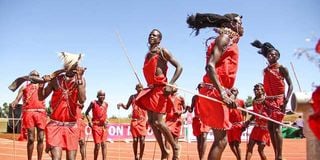
Principal Secretary for the State Department for Culture and Heritage Ummi Bashir addresses the media at her Upperhill office on October 17, 2024.
The government has renewed plans for a national dress code, which will largely be decided by the local textile industry and designers.
In its quest, the government through the State Department for Culture, Arts and Heritage is trying to push for the dress code identity with which Kenya will be recognized on the international stage.
Speaking to Nation.Africa on the measures the Kenya Kwanza Administration has put in place to breathe new life into the idea that collapsed in 2004, Principal Secretary in the State Department of Culture Ummi Bashir said the government will bring on board all stakeholders in relevant sectors to kick-start the process.
"What we are now envisioning as a regime is a bottom-up transformation agenda that will be implemented through the clothes of Kenyans, creating jobs. It will be an inclusive conversation for Kenyans," the PS said.
Unlike the previous attempt, which she said was formulated in the boardroom, local industries and designers will be at the forefront in coming up with at least five traditional dresses that will represent all the communities in the country.
The PS reiterated that the government will come up with a competitive design of Kenyan dress, which will not only impress the locals but have attention across the borders as well, just like the Kenyan bracelet which has frequently been spotted in different countries.
She noted that in different countries across the African continent, it is easy to recognise someone from Ghana, Nigeria and other Western countries by their dress codes, which have been in place for many years.
While the attempt in 2004 saw the country spending about Sh50 million yet the exercise was not successful, the PS says that her department is planning to approach it differently by allowing the common Kenyan to have a final say.
“We want to go around the country asking Kenyans if it is necessary to have it at this juncture, how much is it going to cost because this is a dress that is not for free, this is a dress that tailors will make.”

Maasai traditional dancers entertain guests at a past public event.
If the exercise is fulfilled, Kenyans will be wearing such designed national dress during national holidays and to feel good as Kenyans, hence strengthening unity.
“Suits and ties are not our culture, these are things that came about because of the colonial period and we were trying to emulate and copy what other people were wearing and loving as their cultures.”
PS Bashir, who is the only female Muslim PS said that the government has not allocated any money towards the exercise and that no money has been spend so far, dismissing the allegations that her department has used Sh100 million.
“At the end of the day, the buck stops with money, which we don’t have, we have to source in terms of asking for partnerships, sponsors through banks and see if they can partner with us…when the conversation came about Sh100 million, frankly speaking, there is no dress that is going to cost that much.”
It is a matter of wait and see if the government will be successful in its bid this time round, and if it will subsequently see Members of the Parliament who have been wearing suits and ties in the chamber will prefer them.
At the moment, traditional or cultural attires is not permitted in the Chamber, House Committees, lounges and dining areas since the country is yet to agree on the national dress codes.





